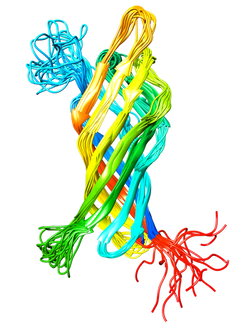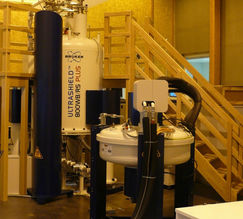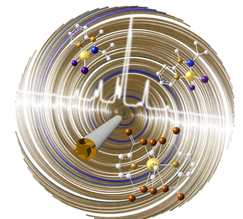
Guido PINTACUDA
CNRS Research Director and Head of the CRMN
I am a CNRS Research Director and have been the head of the Lyon High-Field NMR Center (CRMN) since 2019. My primary commitment lies in advancing the field of NMR by pushing the limits of NMR cutting-edge methodologies and high-field instrumentation to explore new applications and open innovative analytical avenues. As head of the CRMN, I focus on fostering a collaborative and vibrant research environment, strengthening the coherence and impact of the Center's research themes, and maintaining our unique, state-of-the-art NMR equipment. My goal is to keep the Center at the forefront of high-field NMR, both for our team and for the broader community of external users.
Driving NMR to new frontiers also means investing deeply in innovation, supported by strong partnerships, notably with Bruker Biospin, a global leader in NMR technology, as well as collaborations with academic and industrial researchers who leverage NMR for competitive advantage. I am passionate about mentoring students and postdocs, whether at ENS Lyon, in the doctoral chemistry program, or through international thematic schools. In addition to our local activities, I highly value our collaborations within national and international networks, which I engage with actively through European project coordination and research initiatives.

01 RESEARCH
ONGOING PROJECTS. SEE MORE >
RECENT RESEARCH GRANTS

Principal investigator
P-MEM-MAS
ERC consolidator grant
2015-2021
2.5 M€

Principal Investigator
Cis-Pt@hCTR1
Ligue contre le cancer
2023-2024
30 k€

Principal investigator
CTRbyNMR
ANR PRC 2023
2023-2026
384 k€ (220 k€ @ CRMN)
Partner
MOFSONG
ANR PRC 2024
2024-2027
750 k€ (80 k€ @ CRMN)

Research collaboration
150+ kHz MAS
Bruker Biospin
2023-2025
220 k€

Principal investigator
IRICE program
Région Auvergne-Rhone-Alpes
2018-2023
3.8 M€

Partner
MrLATVIA
HORIZON-WIDERA-
-2023-ACCESS-02
2024-2027
1.5 M€ (366k€ @ CRMN)

Co-coordinator
PANACEA
H2020-INFRAIA-2020-1
2021-2025
5 M€ (740 k€ @ CRMN)

Partner
PULCO
PEPR B-BEST
2025-2029
1.4 M€ (220k€ @ CRMN)
02 PROFESSIONAL EXPERIENCE
2024: Promotion to exceptional class
CNRS Research Director (DRCE)
2019 - now
High-field NMR center (CRMN)
Lyon (FR)
Director
2015-2019
Institute of Analytical Sciences
Lyon (FR)
2015: Promotion to 1st class
CNRS Research Director (DR1)
2009-2015
High-field NMR center (CRMN)
Lyon (FR)
2009: Habilitation à Diriger des Recherches
Promotion to 2nd class
CNRS Research Director (DR2)
2005-2009
Ecole Normale Supérieure,
Lyon (FR)
Tenured CNRS researcher (CR1)
in Lyndon Emsley's solid-state NMR group
2004
Australian National University
Canberra (AU)
2001-2004
Post-doctoral researcher
in Gottfried Otting's biomolecular NMR group
Karolinska Institutet,
Stockholm (SE)
Post-doctoral researcher
in Gottfried Otting's biomolecular NMR group
1998-2002
Scuola Normale Superiore
Pisa (IT)
PhD student
under the direction of Pr. L. Di Bari and P. Salvadori
1992-1997
Scuola Normale Superiore
Pisa (IT)
Undergraduate student
Class of Sciences
CAREER HIGHLIGHTS
ERC Consolidator Grant (2015-2021): Developed ultra-fast magic-angle spinning (MAS) NMR to characterize challenging samples. This work has resulted in over 30 high-impact publications, with over 1000 citations annually, and more than 50 invitations to international conferences. These advancements established solid-state NMR as a powerful tool for tackling molecular science and chemistry challenges.
Director of CRMN Lyon (2019-present): At the request of governing bodies, I structured CRMN with a dedicated scientific agenda, independent administrative coordination, and autonomous financial management. My priorities include optimizing the center’s operation through key recruitments, maintaining its world-class instrumentation, and increasing access for academic and industry users.
CNRS National Committee Section 12 (2016-2021): Served a five-year term representing analytical chemistry research, evaluating researchers, research units, and participating in HCERES lab evaluations. I contributed to recruitment processes and served as a liaison in multiple national assessments.
Infrastructure Project Lead: IRICE & PANACEA (2018-present): I led the IRICE project (AURA region) and currently co-coordinate with my colleague A. Lesage the European PANACEA consortium (H2020), aimed at modernizing our center, expanding NMR applications for non-specialists, enhancing output, and strengthening our center's European network.
Sackler Prize (2017) & ISMAR Fellow (2020): Awarded the Sackler Prize from Tel Aviv University for "elegant methodological advances in solid-state NMR, including proton detection, and for their application to complex biological systems." Subsequently elected as an ISMAR Fellow, a recognition granted to pioneers in magnetic resonance research.

CONTACT
CRMN / Lyon High-field NMR center
(Centre de RMN à Très Hauts Champs de Lyon)
UMR 5082 CNRS / Ecole Normale Supérieure de Lyon /UCBL
5 rue de la Doua
69100 Villeurbanne (Lyon), France
guido.pintacuda[at]ens-lyon.fr
Tel: +33-4-87 62 93 16 (office)
Tel: +33-4-87 62 93 03 (admin)

HOW TO REACH US
From Lyon-Saint Exupéry Airport:
Take the Lyon Rhonexpress shuttle and stop at "Vaulx-en-Velin la Soie" (20 minutes) or "Part-Dieu" Station (30 minutes).
From "Vaulx-en-Velin la Soie", take metro line A and stop at "Charpennes"/ From "Part-Dieu" Station, see directions below.
In Charpennes, take either Bus line C17, and stop at "CNRS" (fastest), or tram T1 direction "IUT Feysinne", and stop at "INSA-Einstein".
From Part-Dieu Train Station (Lyon Main Station):
If you arrive by train: exit the station, take "Vivier Merle" exit, towards public transportation.
If you arrive from the airport shuttle: enter and cross the train station, then take the "Vivier Merle" exit towards public transportation Tram T1 or metro B.
Easy way: Take Tram T1, direction "IUT-Feyssine", and stop at "INSA-Einstein" (~25 min. tram)
Other options: Take metro Line B, direction "Charpennes", and stop at "Charpennes". In Charpennes, take either Bus line C17, and stop at "CNRS" (fastest), or tram T1 direction "IUT Feysinne", and stop at "INSA-Einstein".
From Perrache Train Station:
Take Metro Line A, and stop at "Charpennes"
In Charpennes, take either Bus line C17, and stop at "CNRS" (fastest), or tram T1 direction "IUT Feysinne", and stop at "INSA-Einstein".
Alternatively, take metro Line A until stop "Republique", and then walk to the lab (about 10 minutes walk).










